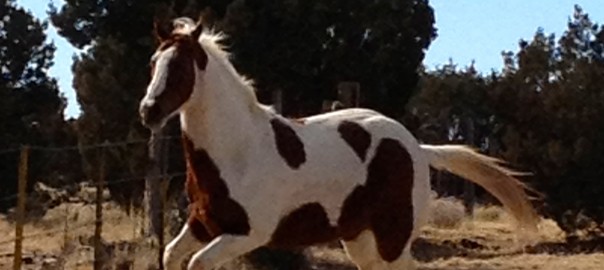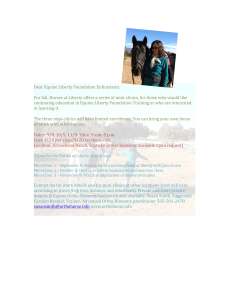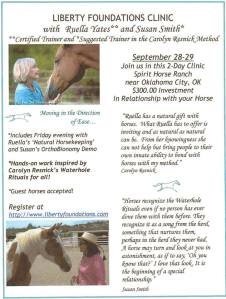Patches knew all these things …once, and then his life changed. When he came to us he didn’t want to do much that meant he had to “perform.” He had been a ribbon-winning show horse and then a therapeutic riding horse. At first he was on good behavior with us. He loved children so it was easy for him to carry a child. It was one thing he truly enjoyed.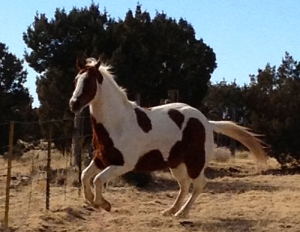
He loved liberty training. I tried to keep him where he loved everything, as I noticed as he became comfortable ( I call it the “honeymoon” period, although some horses don’t have them), he showed more signs of trauma. He would let me ride him but he seemed anxious even though I wasn’t expecting much. Saddling up was tough for him – he’d kick out, flatten his ears, sometimes would refuse to move.
A woman who had known him as a show horse said she rode him before we bought him and she said he wasn’t interested in showing any more.
But there was something in him, a desire to show off, to play, to dance. So I left him for awhile, did a lot of bodywork, hung out with him, didn’t expect much.
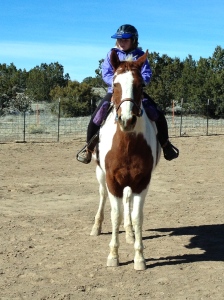 This spring we began trail rides. Patches really enjoyed them, going out with the other horses, trotting fast where he had done a Western Pleasure jog before. He became more surefooted. He stopped kicking out when cinched up. He looked pleased with himself. He came back from his rides and rolled happily in the dirt. This summer I have begun to ride him in the arena. I wanted to see how he felt. No resistance, just offered me what he knows so well, little Western Pleasure jog, but without the peanut rolling that he came with. He already knew I didn’t want his nose on the ground from our trail rides (it took me a few months to get his head up where he could see where he was going.) Picking up his feet. I urged him into a rising trot and at first he said no, I’m going to show you this. This is what I’m so good at. We trotted around and around, and after awhile I asked him for a regular trot and he was fine with it.
This spring we began trail rides. Patches really enjoyed them, going out with the other horses, trotting fast where he had done a Western Pleasure jog before. He became more surefooted. He stopped kicking out when cinched up. He looked pleased with himself. He came back from his rides and rolled happily in the dirt. This summer I have begun to ride him in the arena. I wanted to see how he felt. No resistance, just offered me what he knows so well, little Western Pleasure jog, but without the peanut rolling that he came with. He already knew I didn’t want his nose on the ground from our trail rides (it took me a few months to get his head up where he could see where he was going.) Picking up his feet. I urged him into a rising trot and at first he said no, I’m going to show you this. This is what I’m so good at. We trotted around and around, and after awhile I asked him for a regular trot and he was fine with it.
I think of what this big, beautiful horse has lived through, what we all live through, how we might have been treated, what trauma we hold in our bodies that keep us from achieving what we might like to achieve, what stories we believe about ourselves. I feel the joy rise up in Patches as he shows me what he knows, how proud he is. He is ready to show his true potential, so different from the horse who was at one time resistant when asked to do something.
I’d say it took two years to accomplish this with Patches. I wanted to give him the time he needed and I took direction from him in that regard. I gave him experiences that he could manage and feel good about. He would always let me know if something was too much. I had other horses to ride and work with so I didn’t focus all my searing attention on Patches. I gave him a lot of space. I hung out with him, played with him, had the grandkids ride him, even took him to Oklahoma where he showed his star quality and flirted with everybody.
I had to put aside my agenda: What do I think this horse should accomplish by this time? It isn’t about when or how long; it’s about when he or she is ready. Is the horse anxious, depressed, traumatized by a past experience? What are the holes in his training? What has caused him to resist so strongly in some areas? I have to think of that. I have a different time frame than horses. I have to think like a horse to get the best things done with them.
Horses do not think in past, present and future as people do. They think only of the present moment. The past is embodied in them, meaning it is in their bodies. So when you teach them to half-pass, for example, it stays in their body and is not something they think of. Trauma may get in the way of them actually doing it, or they may not respond to confusing cues or cues that are different from how they were taught. They also may not be able to physically execute a move they could do when they were younger. That’s true of Khami, my gelding, who at 24 can no longer do flying lead changes or top ten a 50 mile ride. I can tell that it’s difficult sometimes for Patches to do a half pass on one side.

Although we have dreams of what we would like to do with our horses, in some relationships, our expectations can kill our dreams. Some horses really require a long period of time in work that is not very demanding. They may need a time for convalescence. Think about a time when you have had too much going on, or too many stresses, and you feel like you have no resources. That’s how a horse can feel when it is expected to perform, but he just doesn’t have the juice to do it.
It may take time for that horse to fill with curioisity and joy, but it is entirely possible.
[youtube=http://www.youtube.com/watch?v=BftFbEJ9ixg&w=420&h=315]A good way to experience work on yourself besides having a people session is to have a horse and rider session. For those who want to experience horse and rider work, take advantage of $10 off one session with me – good for the rest of August through the end of September.
Services: Bodywork (Ortho-Bionomy for people, Equine Positional Release/Equine Ortho-Bionomy): private sessions, tutorials, phone consultations, distance healing and gift certificates
Liberty Training: clinics, mini-clinics, workshops, private and semi-private sessions, tutorials, consultations: by appointment: 505.501.2478 or emailing susansmith@orthohorse.info
Looking forward to Fall Liberty Training mini-clinics – Tell a friend and get to experience liberty work together! Dates: September 8, October 5, November 9 – 9-5 p.m. Contact me for details.
Liberty Foundations Waterhole Rituals Equine Clinic at Spirit Horse Ranch near Oklahoma City, co-teaching: Ruella Yates, Certified Carolyn Resnick Trainer and Susan Smith, Suggested CR Trainer. Liberty Horse Training. September 28-29, 2013. Contact Ruella Yates at ruella@libertyfoundations.com, or 405-771-4274. Susan will be giving a three-hour tutorial on her OrthoHorse bodywork for a limited number of students. Call 505-501-2478 or email susansmith@orthohorse.info for details.
Liberty Foundations Waterhole Rituals Equine Clinic at Spirit Horse Ranch near Oklahoma City, co-teaching: Ruella Yates, Certified Carolyn Resnick Trainer and Susan Smith, Suggested CR Trainer. Liberty Horse Training. September 28-29, 2013. Contact Ruella Yates at ruella@libertyfoundations.com, or 405-771-4274. Susan will be giving a three-hour tutorial on her OrthoHorse bodywork for a limited number of students. Call 505-501-2478 or email susansmith@orthohorse.info for details.



